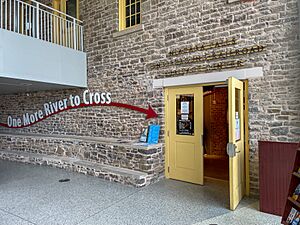Niagara Falls Underground Railroad Heritage Center facts for kids

Entrance
|
|
| Established | 2018 |
|---|---|
| Location | Niagara Falls, |
| Type | African American history |
| Public transit access | |
The Niagara Falls Underground Railroad Heritage Center is a special museum in Niagara Falls, New York. It teaches visitors about the Underground Railroad. This was a secret network that helped enslaved people escape to freedom. The museum opened its doors in 2018. It is located on the first floor of a historic building. This building was once a U.S. Customhouse, built in 1863. It is part of the Niagara Falls Station and Customhouse Interpretive Center.
History of the Museum
The idea for a museum about the Underground Railroad in Niagara Falls started in 2007. Charles A. Walker and Kevin E. Cottrell first suggested it. They called their idea "North Star on North Main."
New York State began providing money for the project in 2008. The State Legislature created a special group. This group, called the Niagara Falls Underground Railroad Heritage Commission, worked to create the museum. In 2009, a state law was changed to give the commission $350,000 each year. This amount was later changed to $200,000 a year in 2011.
The museum officially opened on May 4, 2018. It is recognized by the National Park Service. It is also part of the Niagara Falls National Heritage Area. The museum is run through a partnership. This partnership is between the National Park Service and the Niagara Falls Underground Railroad Heritage Commission.
Museum Exhibits

The Niagara Falls Underground Railroad Heritage Center is an "experiential" museum. This means it helps you feel like you are part of the story. It has exhibits that let you learn by experiencing things.
- "One More River to Cross" is a main exhibit. It tells the story of the Underground Railroad in Niagara Falls. It shows how the location of Niagara Falls was important. It also highlights the brave actions of local residents. Many African-American residents played a key role in helping people escape.
- Cataract House is another exhibit. It recreates parts of the Cataract House hotel. This hotel in Niagara Falls had an all-African-American wait staff. These workers secretly helped many enslaved people reach freedom in Canada.
- International Suspension Bridge is also recreated. This bridge was built in 1848. It was rebuilt in 1855 to carry trains. Brave people like Harriet Tubman used this bridge. They crossed it to find freedom in Canada.
In 2019, the "One More River to Cross" exhibit won an Award of Excellence. This award came from the American Association for State and Local History (AASLH).
See also
External links
- Niagara Falls Underground Railroad Heritage Center
- Underground Railroad in Niagara Falls Podcast with President and Chairman of the Niagara Falls Underground Railroad Heritage Area Commission Bill Bradberry
 | Janet Taylor Pickett |
 | Synthia Saint James |
 | Howardena Pindell |
 | Faith Ringgold |

